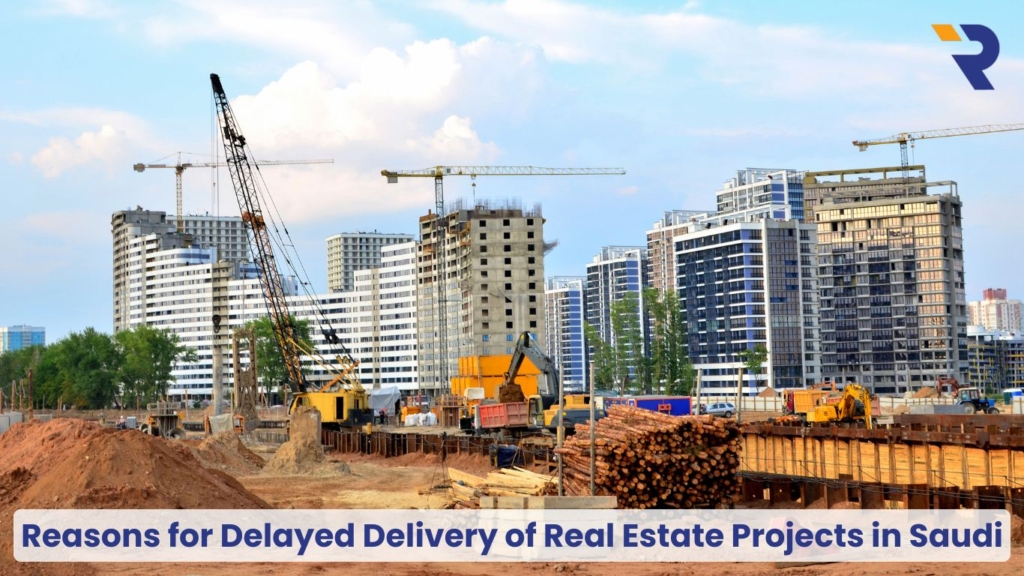Main Reasons for Delayed Delivery of Real Estate Projects in Saudi Arabia
1. Delays in issuing licenses and government permits
One significant reason for delays in delivering real estate projects in Saudi Arabia is the slow issuance of required licenses and government permits. Despite initiatives like digital platforms such as “Etmam” and “Balady” designed to streamline these processes, many projects still encounter bureaucratic hurdles, especially in regions with unique regulatory conditions or when multiple government entities are involved. These early-stage delays substantially impact the overall project timeline.
2. Weak planning and management by some developers
Another major issue is inadequate planning and poor management practices among certain developers. Often, real estate projects commence without comprehensive feasibility studies or realistic timelines that account for potential execution challenges. This absence of effective project management results in miscommunication and delays among contractors, suppliers, and engineering teams. Additionally, developers lacking the necessary expertise to handle large-scale projects significantly increase the likelihood of costly errors and extended project timelines.
3. Financial issues and lack of liquidity
Financial instability is a critical factor behind project delays. Some developers depend heavily on anticipated revenue from future unit sales, lacking sufficient financial reserves to sustain construction if sales are slower than expected. Consequently, projects may temporarily or permanently stall when developers face difficulties securing additional funds from financial institutions, particularly if the project’s credit rating is weak. Moreover, changing financial regulations or stringent bank requirements can further complicate financing.
4. Fluctuations in construction material prices
Price volatility in construction materials, particularly due to global supply chain disruptions and escalating shipping costs, contributes significantly to delays. Rising prices for essential items like iron, cement, insulation materials, and wood frequently compel developers to renegotiate with suppliers or delay procurement until prices stabilize. Additionally, local market shortages and dependence on imported materials without readily available substitutes amplify these issues, particularly amid international crises or natural disasters.
5. Shortage of skilled labor and technical expertise
The shortage of specialized skilled labor and technical expertise is another prominent obstacle. Although Saudi Arabia has a substantial workforce, many projects require niche skills not readily available domestically, necessitating the hiring of foreign labor. Visa and recruitment complications further exacerbate these delays. Moreover, shifts in labor regulations and market dynamics can disrupt workforce stability, creating shortages during crucial construction phases. Limited local vocational training programs also contribute to a persistent skills gap, resulting in reliance on temporary, less sustainable labor solutions.
6. Frequent design changes during construction
Frequent design alterations requested by investors or clients during construction significantly delay project timelines. Even minor modifications typically require additional engineering reviews and regulatory approvals, causing workflow disruptions on-site. Many developers lack management systems flexible enough to integrate these changes efficiently, leading to contractor rescheduling and productivity issues, particularly in complex projects requiring precise team coordination.
7. Environmental or emergency factors
Lastly, unforeseen environmental or emergency factors play a critical role in delaying real estate projects. Adverse weather conditions, including heavy rains or sandstorms, often impede progress, especially in exposed locations. Additionally, global crises such as pandemics, financial market instability, or geopolitical tensions can disrupt supply chains and reduce available labor. These impacts are particularly severe in remote areas with limited access to materials and workers, highlighting the necessity for robust contingency planning.
Read: Saudi Arabia Allows Foreign Investors to Own Real Estate
Proposed Solutions to Address Project Delivery Delays
Several solutions can mitigate these delays, addressing regulatory, financial, and technical aspects:
- Accelerate government processes through complete digital transformation of licensing and permitting.
- Improve coordination among governmental entities to streamline and unify regulatory requirements.
- Enhance developer capabilities by mandating approved execution plans and periodic monitoring.
- Strengthen regulatory oversight by enforcing penalties for unjustified delays and promoting accountability.
- Establish real estate financing funds to provide temporary liquidity support during financial difficulties.
- Adopt modern construction technologies such as prefabricated systems and 3D printing to accelerate construction phases.
- Foster strategic partnerships with reliable suppliers to manage material price fluctuations effectively.
- Implement flexible project management systems capable of integrating design changes without significant disruptions.
Read: KSA Real Estate Predictions 2025
Impact of Implementing These Solutions on the Saudi Real Estate Market
Implementing these solutions can yield considerable positive outcomes for all real estate market stakeholders:
- Boost market trust by ensuring timely project completion and enhancing investor confidence.
- Foster transparency and predictability, encouraging sustainable, long-term investments.
- Attract foreign investment through demonstrated performance reliability and disciplined market practices.
- Reduce investment risks by ensuring projects are managed effectively, thereby increasing funding opportunities.
- Enhance developer reputations through consistent fulfillment of commitments, facilitating further expansion and strategic collaborations.
- Promote sustainable growth across residential, commercial, and industrial sectors within the Saudi real estate market.
Read: Saudi Arabian Property Market Opens to Foreign Investors
Seize the Best Real Estate Investment Opportunities in Saudi Arabia with Real Estate Saudi
Real Estate Saudi invites you to explore and seize prime real estate investment opportunities in the Kingdom. Our team provides expert real estate consultations, helping investors select trustworthy, high-potential projects. We ensure projects adhere strictly to quality standards and timelines through meticulous monitoring. Don’t miss your chance to confidently invest in successful real estate ventures in Saudi Arabia.
Book a Free Real Estate Consultation with Real Estate Saudi.
Certain FAQs
Why are real estate projects delayed in Saudi Arabia?
Real estate projects in Saudi Arabia face delays primarily due to slow government licensing, poor developer management, financial constraints, fluctuating material prices, shortages of skilled labor, frequent design modifications, and environmental or emergency situations.
How can developers avoid delays caused by licensing and permits in Saudi Arabia?
Developers can mitigate delays by using digital platforms such as “Etmam” and “Balady,” preparing comprehensive feasibility studies, maintaining clear communication with government entities, and ensuring all regulatory requirements are clearly understood and addressed from the start.
What impact do fluctuating construction material prices have on Saudi real estate projects?
Fluctuations in construction material prices significantly delay projects, causing budget overruns and procurement challenges. Developers should form strategic partnerships with reliable suppliers and maintain contingency budgets to manage these price variations effectively.
What strategies can help improve liquidity for real estate projects facing financial difficulties in Saudi Arabia?
Developers can address liquidity issues by establishing real estate financing funds, diversifying financing sources, maintaining adequate financial reserves, and closely monitoring sales projections and revenue streams.
How does skilled labor shortage affect the Saudi real estate market, and what can be done about it?
Skilled labor shortages lead to significant project delays and increased costs. Addressing this issue involves enhancing vocational training programs, simplifying recruitment processes for foreign specialists, and adopting modern construction technologies like prefabrication and 3D printing.





